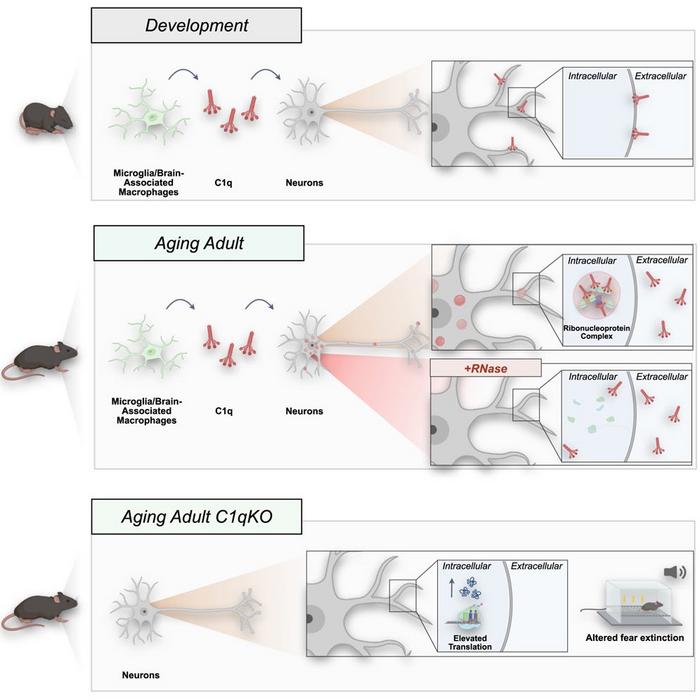BOSTON, Mass. (July 15, 2024)—A groundbreaking study conducted at the lab of Beth Stevens, PhD, at Boston Children’s Hospital has revealed that an immune protein impacts neuronal protein synthesis in the aging brain. Previous work from the Stevens lab had uncovered that immune cells in the central nervous system, microglia, help prune synapses in the developing brain by tagging synapses with the immune protein C1q. New research led by Nicole Scott-Hewitt, published in Cell, shows that neurons can also internalize C1q. C1q seems to influence protein production inside neurons by interacting with ribosomal proteins, RNA-binding proteins, and RNA in the cell’s cytoplasm. Additionally, C1q accumulates in neurons over time, suggesting it may play a role in age-related cognitive changes and neurodegenerative conditions.

Credit: Boston Children’s Hospital
Beth Stevens Laboratory
BOSTON, Mass. (July 15, 2024)—A groundbreaking study conducted at the lab of Beth Stevens, PhD, at Boston Children’s Hospital has revealed that an immune protein impacts neuronal protein synthesis in the aging brain. Previous work from the Stevens lab had uncovered that immune cells in the central nervous system, microglia, help prune synapses in the developing brain by tagging synapses with the immune protein C1q. New research led by Nicole Scott-Hewitt, published in Cell, shows that neurons can also internalize C1q. C1q seems to influence protein production inside neurons by interacting with ribosomal proteins, RNA-binding proteins, and RNA in the cell’s cytoplasm. Additionally, C1q accumulates in neurons over time, suggesting it may play a role in age-related cognitive changes and neurodegenerative conditions.
The study, titled “Microglial C1q accumulates in neuronal ribonucleoprotein (RNP) complexes across aging,” has been published in Cell, highlighting the following key findings:
Changes in Brain Protein Production with Age:
In adult mice lacking a protein called C1q, there is a significant increase in the production of proteins in neurons and a change in the balance of proteins in the brain, suggesting that C1q may be important for keeping the brain’s proteins in check. These changes are specific to age, with noticeable differences in protein production in adult mice compared to younger ones.
How Neurons Take in C1q:
Neurons can take in C1q protein from outside the cell. This process depends on endocytosis, a way cells internalize molecules. The study found that a part of the C1q protein called the collagen-like domain is crucial for this uptake by neurons.
Impact on Learning and Memory:
Deleting C1q in microglia in adult mice affects their ability to forget fear memories, showing C1q’s importance in learning and memory. This suggests that C1q helps with memory and brain flexibility, potentially by interacting with specific neuronal complexes that impact neuronal protein production.
C1q’s Role in the Aging Brain:
Previous research showed that C1q levels increase significantly as the brain ages. While C1q is known for its roles on the surface of neurons and synapses in brain development and disease, its functions in the aging brain were unclear. This study used a broad approach to discover how C1q interacts with other proteins as the brain ages, discovering that C1q interacts with RNA-binding proteins in the aging brain. This was a surprising find, as it showed the presence of C1q inside neurons in older brains, indicating that immune proteins produced by brain macrophages, like microglia, can also impact internal neuronal functions.
Effects of Losing C1q on Protein Production and Memory:
The study examined if the absence of C1q affects protein production in the brain as it ages. They found an increase in protein production in the neurons of adult mice lacking C1q. Additionally, removing C1q affected the mice’s ability to forget fearful experiences, indicating a unique role of C1q in the adult brain, independent of its previously described functions in synapse pruning.
For more insights into the intricate role of microglia in neuronal translation, check out this detailed piece from ALZFORUM: C1q: Microglia Meddles in Neuronal Translation
Media Contact:
Journal
Cell
Article Title
Microglial-derived C1q integrates into neuronal ribonucleoprotein complexes and impacts protein homeostasis in the aging brain
Article Publication Date
27-Jun-2024




